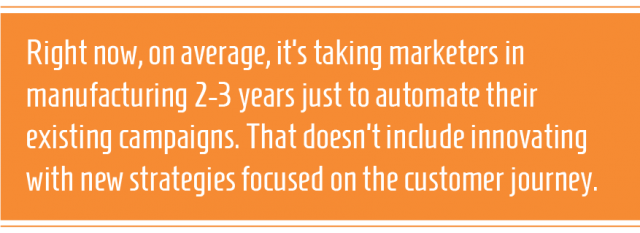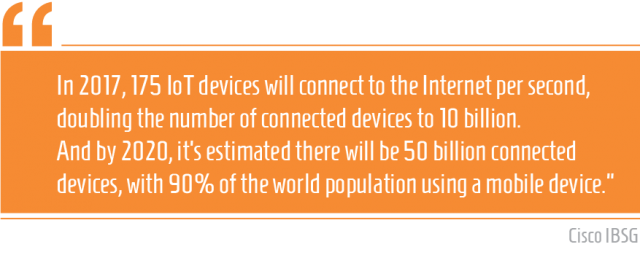Here’s what you need to know:
1. Focus on Through-Channel Marketing
It’s a simple truth: if sales are your top priority, strengthening your partner channels should be, too.
What It Means to You
To set their partners up for success, manufacturers across the industry are beginning to:
- Shift from portals to collaborative communities, creating a foundation to ultimately better engage with customers.
- Create responsive, mobile-friendly access to the tools that partners need on a wider scale.
- Market through partners by giving them the right campaigns, tools and content to engage with their customers.
2. Transition to Digital Marketing
Until recently, manufacturing has been behind the curve when it comes to embracing digital marketing. But more marketers are shifting from mass media budgets to focus their dollars on digital and social.
What It Means to You
In particular, marketers in manufacturing will:
- Focus on re-engagement campaigns for existing customers, using marketing automation.
- Test and optimize content through social ads and listening for higher performance.
- Rely on measurement as a catalyst for change – using data, instead of gut feelings or past history, to drive decisions.
3. Power of Marketing Automation
In the digital age, new business processes and competitive pressures are pushing manufacturers to automate campaigns and make data-driven decisions.
When it comes to indirect sales channels in particular, automation offers a long list of advantages – from increased efficiency for you to simplifying processes for your partners.
What It Means to You
Moving forward, leading manufacturers will:
- Shift from product-based campaigns to mapping content across the customer journey and automating marketing campaigns.
- Use automation to streamline repeatable and tactical initiatives – freeing up resources to focus on more strategic ones.
- Integrate marketing campaigns throughout the configure, price and quote steps of the order process.
4. The Rise of Connected Machines
The Internet of Things (IoT) represents the next evolution. Every device is becoming connected, from flow sensors and sorting machines in the factory to washing machines and wearables – all at the touch of a button.
What It Means to You
How does this translate to the manufacturing industry? IoT data will dramatically:
- Transform everything from the factory floor to the data used to predict maintenance, machine performance and even sensor alerts when machines and consumer products operate outside their intended purposes.
- Increase efficiency and effectiveness of the value chain in real-time.
- Ultimately redefine how manufacturers meet industry demands.
5. Master Data Management
Social posts. Product configuration and quotes. Service complaints. Today customers have multiple touchpoints with every brand. And in B2B, there are twice as many people and processes, not to mention data in twice as many systems.
What It Means to You
For manufacturers everywhere, mastering data management will be vital to:
- Improve decision-making for everything from high-level strategy to low-level forecasting adjustments.
- Personalize the customer experience, complete with narrower segmentation and tailored products and services.
- Improve the next generation of products and innovation.
6. Embracing & Integrating Ecommerce
It isn’t easy to stand out from the competition. To differentiate themselves, manufacturers are looking for more ways to create more value for customers, particularly through ecommerce.
What It Means to You
To create more services for customers, manufacturers will:
- Integrate their ecommerce and partner channel strategies to provide more accessibility to products and services for their customers and more value for their partners.
- Integrate ecommerce and IoT to streamline the buying process for customers.
- Leverage ecommerce data and insights for continuous product improvement.
What Else Is on the Horizon?
Let’s talk about what trends may impact your company – and what you can do to meet them head-on.




